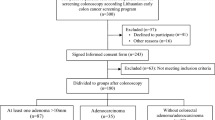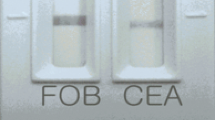Abstract
Monoclonal antibodies against colon and pancreatic cancer, CL-2, CL-3, PS-9, PS-10, were used to detect the associated antigens in feces of patients with gastrointestinal carcinoma and non-cancer diseases. Binding inhibition test by SABC-ELISA method were performed for the measurement of the antigen level. Results showed that the associated antigen detected in feces of patients with colon cancer were significantly higher than that of noncancer disease or normal subjects. The positive rates were 61.1% as detected with CL-2; 53.4% with CL-3; 55.0%, PS-9; and 53.3% PS-10 in cancer patients while that in normal subjects were 7%; 9%; 8%; and 8% respectively. When ‘cocktail’ of CL-2, PS-9 and PS-10 were used, the positive rates were 92.5% in colon cancer and 14% in normal subjects. In seven out of the sixty patients with colon cancer studied who were graded as Dukes A, the results were all positive. The results seem superior to the serologic detection and may provide a promising new approach in the early diagnosis of colon cancer.
Similar content being viewed by others
References
Stubbs R, et al. Fecal carcinoembryonic antigen in colorectal cancer patients. Gut 1986; 27: 901.
Shimano T, et al. Usefulness of carcinoembryonic antigen measurement in feces of patients with coloectal cancer. Dis Colon Rectum 1987; 30: 607.
Fujmoto S, et al. Clinical value of fecal CEA as an aid to diagnosis. Cellul Molec Biol 1979; 25: 153.
Rittenhouse HG, et al. Mucin-type glycoprotein as tumor markers. Lab Med 1985; 15: 556.
Shuster J, et al. Metabolism of human carcinoembryonic antigen in xenogenic animals. Cancer Res 1973; 33: 65.
Kalthoff H, et al. Characterization of CA19—9 bearing mucins as physiological exocrine pancreatic products. Cancer Res 1986; 46: 3605.
Hanisch FG, et al. CA125 and CA19—9: Two cancer associated sialysaccharide antigens on a mucus glycoprotein from human milk. Eur J Biochem 1985; 149: 323.
Vlock DR, et al. Incidence of serum antibody reactivity to autologous head and neck cancer cell lines and augmentation of antibody reactivity following acid dissociation and ultrafiltration. Cancer Res 1989; 49: 1361.
Author information
Authors and Affiliations
Rights and permissions
About this article
Cite this article
Mei, Y., Yan, L., Lihua, F. et al. Detection of cancer-associated antigen in feces using monoclonal antibodies in the diagnosis of colon carcinoma. Chinese Journal of Cancer Research 3, 63–67 (1991). https://doi.org/10.1007/BF02671296
Issue Date:
DOI: https://doi.org/10.1007/BF02671296




